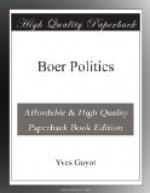Mr. Wybergh in a letter of April 10th, to the British Vice-Consul, explains the measures that had been taken to collect and verify the signatures. They were such as to inspire confidence. He states that among the whole number, only 700 are of illiterate or coloured people; and adds, that after the dispatch of the petition 1,300 other signatures were sent in, thus raising the total to 23,000.
The Government of Pretoria, after a lapse of more than a month succeeded in raising a counter-petition addressed to itself, which, at first, it stated, contained 9,000 signatures; some time later, on the 30th of May, the British Government was informed that it numbered 23,000 signatures. Krueger wished to prove that he had at least the same number of partisans.
Only he had out-witted himself in the drawing up of this counter-petition. His signatories affirmed that security of property and individuals was assured in the Transvaal. Pangloss, himself, would not have gone so far.
4.—Security of the Individual according to Boer ideas.
Krueger’s petitioners further asserted that the petition to the Queen was “the work of capitalists and not of the public.” As a matter of fact, incensed at the murder of Edgar—a working man—the men who were the first to sign that petition were working men. The principal mining company of Johannesburg had shown an example of that prudence we see too often among capitalists, and had dismissed Mr. Wybergh, the President of the South African League, who was one of their employes. The President of the Chamber of Mines, Mr. Rouliot, in his statement of January 26th, 1899, took pains to dissociate it from the campaign of agitation. This display of weakness availed nothing. The Government of Pretoria took up the attitude that has succeeded so well in deceiving public opinion: that of a council composed of honest men, innocent victims of capitalist rapacity.
5.—The Murder of Mrs. Appelbe.
Here is a proof of the security enjoyed by the Uitlanders, at the very time when the Government of Pretoria closed its list of signatures to the counter-petition. On Friday April 28th, Mrs. Appelbe, the wife of a Wesleyan minister of Johannesburg, was going to chapel accompanied by a Mr. Wilson, a chemist. They were set upon by a band of men in the pay, it is said, of canteen keepers, sellers of liquor to the natives. Mrs. Appelbe received such severe injuries that she died on the Thursday following. Mr. Wilson, who was badly wounded in the head, eventually recovered. On May 8th, the police affected to know nothing of the outrage; nor did they ever discover the murderers of Mrs. Appelbe, thus proving the grand irony of the apologist petition which “emphatically” affirmed the complete security of life and property in the Transvaal.
CHAPTER VIII.
BOER OLIGARCHY.
Dr. Kuyper, who has juggled with these facts, enumerates with a sort of amazed frankness the reproaches addressed to the Transvaal Government:




